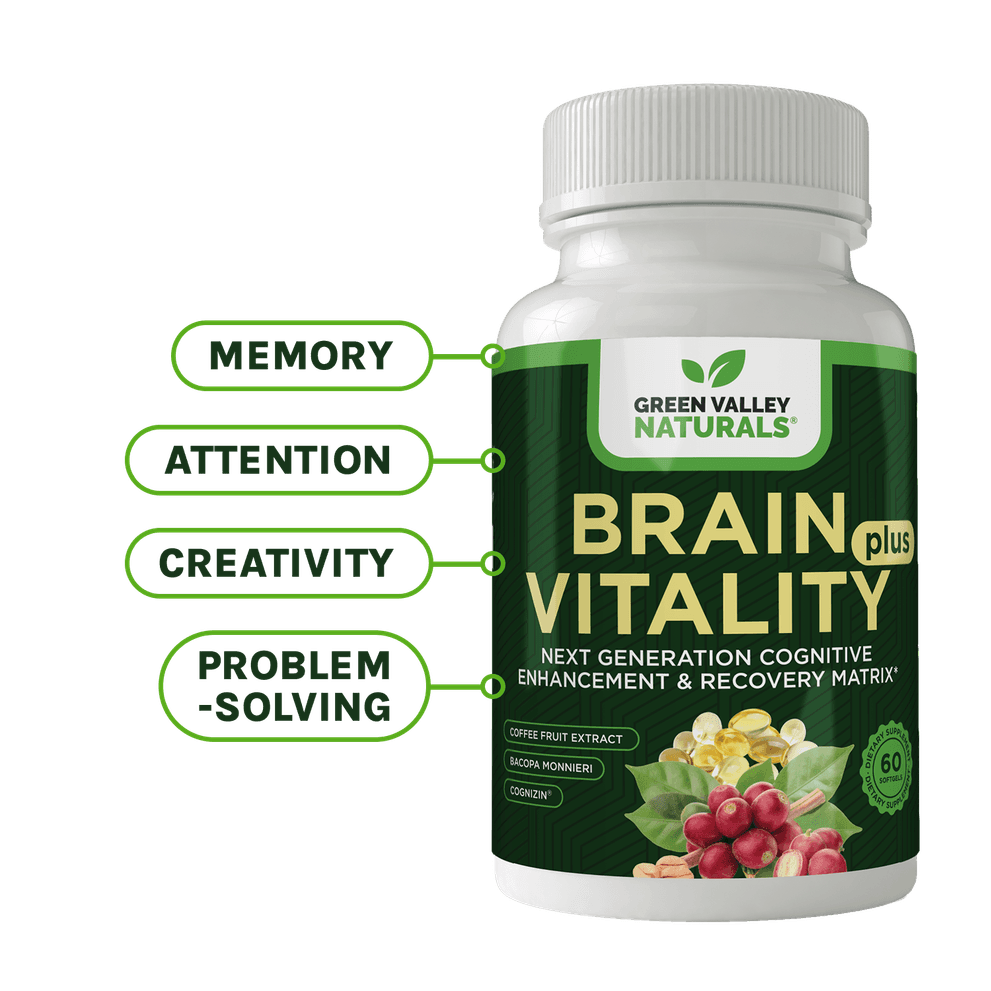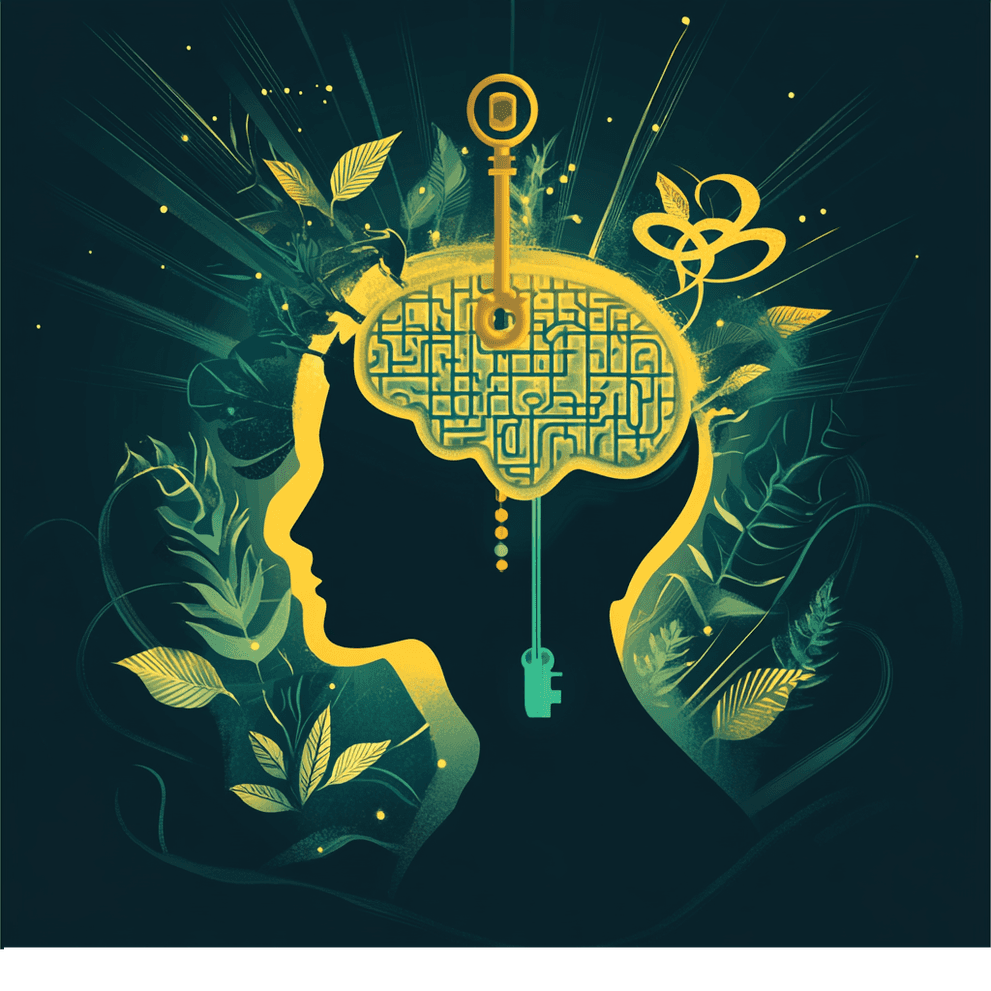
If your brain feels like it’s operating in slow motion—struggling to recall names, focus at work, or even finish a sentence—you’re not alone. Brain fog affects millions of adults, especially as we age. Fortunately, there are many natural ingredients that can help you find relief. In this article, we'll delve into the top 13 natural compounds shown in the latest nutritional science to combat mental fatigue, cognitive drift, and memory decline.
Key Takeaways
Brain fog has many triggers—nutritional deficiencies, stress, and inflammation top the list.
Nootropics like B vitamins, Lion’s Mane, and citicoline help restore memory, focus, and energy.
Combining lifestyle changes with targeted supplements can provide rapid and lasting cognitive improvements.
Experts Say This Is the New Way to Fight Memory Decline
Brain fog is a common condition marked by confusion, an inability to focus, and forgetfulness. It is also called mental cloudiness or brain cloudiness, which share the brain fog meaning.
There's quite a list of brain fog triggers, including underlying medical conditions, sleep deprivation, mental health issues such as stress and anxiety, poor diet, nutrient insufficiencies, sedentary lifestyle, and more.
Since your brain demands many resources and much energy in order to function, it can be significantly benefited by brain supplements called nootropics, including but not limited to vitamin D3, several B vitamins, omega-3 fatty acids, citicoline, Lion's Mane (a mushroom), Phosphatidylserine (PS), Bacopa monnieri, coffee fruit extract, and more.

Understanding Brain Fog
Brain fog and a growing concern about Alzheimer's disease continue to be major concerns from middle age through the senior years. According to AARP, more than 25% of adults ages 55 to 73 take a brain health supplement to support cognitive function. And for those older than 74, that number rises to 36%. 1
Brain fog isn't a medical condition per se. Instead, it's a colloquial collection of symptoms that often occur simultaneously, including confusion, inability to focus, forgetfulness, fatigue, scattered thoughts, and generally feeling like your head is in a cloud or fog. Hence, the name brain fog.
Brain fog can go by other names too, such as brain cloudiness, mental cloudiness, mental fatigue, and cognitive fog. By and large, they all share the brain fog meaning and are characterized by the same symptoms.
Whatever your preferred term, brain fog triggers include medical conditions such as fibromyalgia or chronic fatigue syndrome, medications including chemotherapy, long COVID, chronic stress, and nutritional deficiencies or insufficiencies—all of which are known to impair cognitive function.
Brain fog can greatly affect your daily life, sabotage your work performance, and impair overall well-being.
Causes of Brain Fog
There are many reasons you might experience brain fog symptoms. The aforementioned medical conditions, depression, menopause, and medications, for starters.
Lifestyle factors including poor sleep quality, a sedentary lifestyle with lack of exercise, and nutritional deficiencies can play a key or confounding role.
Finally, high stress levels and mental health issues such as anxiety and depression can contribute to brain fog.
Obviously, addressing these "root causes" of brain fog can go a long ways toward improving cognitive symptoms. Dietary supplements can also help by supplying needed nutrients and vital mineral involved in brain function.

The Importance of Brain Health
It might go without saying that healthy brain cells are a key to alleviating brain fog symptoms. A healthy brain ensures good brain development, fights against memory problems, and gives cognitive clarity... essential for learning, memory, and mental clarity.
Your brain consumes an outsized portion of the nutrients you consume, for good or for bad. It works 24/7, even while you sleep—thus demanding a constant supply of high-quality fuel. Let's face it, most of us don't supply our brains with the types of superior-quality fuel they require. Instead we feed it packaged and processed foods, lots of sugar, inflammatory oils, and perhaps even alcohol.
Many studies show a strong correlation between these kind of diets and slow cognitive decline, difficulty concentrating, and increased risk of brain fog.
That's why brain health supplements can help support brain function and nervous system health. The following is what our research found to be the best of the best to address nutrient deficiencies.
Starting to use brain supplements might make you feel like a light bulb just turned on in your brain.

13 Supplements for Brain Function
These key ingredients for brain health appear in no particular order. But they all play key roles for your brain cells and brain health in one way or another.
1. Omega-3 Fatty Acids (Fish Oil)
There are three types of omega-3s:
Eicosapentaenoic acid (EPA)
Docosahexaenoic acid (DHA)
Alpha-linolenic acid (ALA)
EPA and DHA come mostly from fatty fish such as salmon and mackerel, and ALA is found mostly in leafy green vegetables, like Brussels sprouts and spinach, and nuts and seeds like walnuts and flaxseeds. The body converts very little ALA into EPA and DHA, so the best way to get omega-3s is to eat a lot of fatty fish, or use dietary supplements.
Omega-3s help build cell membranes in the brain, provide antioxidants, and protect the brain from inflammation. They maintain fluidity of cell membranes and aid communication between brain synapses. In other words, they're highly essential for brain function.
Omega 3 fatty acids are well-known for their impressive benefits as a brain fog supplement. They improve brain fog symptoms, improve attention and memory, boost mood (which may also help reduce symptoms of brain fog), and reduce anxiety.
2. B-Complex Vitamins
B vitamins, including biotin, B6, B12, and folate, are critical for energy production and brain health. Studies show that insufficient levels of various B vitamins can trigger brain fog symptoms such as memory problems, problems concentrating, and more. Fortunately, dietary supplements of B vitamins can help.
A study of 39,000 people showed that low vitamin B12 levels were linked with more brain fog and poorer memory.
Those who supplemented experienced improved brain function and cognition in 84% of participants and improved scores on memory tests and attention tests in 78%. [4]
Having insufficiency or deficiency in B vitamins including B6 and folate may also reduce mental alertness and increase risk of brain fog, fatigue, weakness, and mood swings.
3. Sage Leaf
Sage is an herb that has been found to improve cognitive function, enhance memory, attention, and focus -- both in healthy adults and those with stress related symptoms and brain fog.
In a placebo-controlled study, brain waves were measured by EEG (electronic encephalogram) before and after treatment. Researchers found a significant change within four weeks -- equating to higher mental capacity and reduced stress. Chronic stress leads to brain fog symptoms and poor sleep quality. If you can reduce stress you can gain better sleep, have less severe brain fog, and improve depressive symptoms.
Other studies show sage leaf can improve working memory and improve mental accuracy in cognitive tasks. This is apparently accomplished by supporting neurotransmitters and preserving acetylcholine levels. [5]
Sage has also been found to boost mood and alertness, calmness, and contentedness, all of which can lead to clearer thinking. [6]
All this should come as no surprise, given that sage is an antioxidant containing rosmarinic acid, which promotes healthy brain cells and blood flow to the brain.
4. Skullcap
Skullcap is an herb in the mint family with a long history of medicinal use. Skullcap acts as a natural sedative to calm an overactive, anxious mind and instill a sense of calm and reduce stress. Scientists believe it works by regulating serotonin and dopamine.
Skullcap also helps reduce anxiety and nervous tension, and can thereby combat mental cloudiness linked to brain fog. Its active compound baicalin has shown potential to improve memory and cognitive function. [7]
Skullcap may have neuroprotective properties that support brain health and cognitive function. It may also enhance overall mood, leading to clearer thinking and reduced brain fog. [8]
5. Silk Protein Hydrolysate
Silk protein hydrolysate is also known as fibroin enzymatic hydrolysate (FEH), which can help relieve brain fog. It is a protein found in the silk of the silkworm, bombyx mori, which contains about 48% of the amino acid glycine.
Studies show that silk FEH improves memory, learning, attention, mental focus, and concentration --all things that worsen in brain fog.
In addition, FEH boasts neuroprotective effects through potent antioxidant and anti-inflammatory properties, which protects brain cells. (Inflammation worsens brain fog.) FEH also appears to protect the cholinergic system from oxidative stress, thereby increasing brain levels of acetylcholine and improving cognitive function.
A placebo-controlled, double-blind study shows that FEH boosted expression of brain-derived neurotrophic factor (BDNF), which is critical to neuron survival and cognitive function. [9] One of the best sources of silk protein hydrolysate is patented Memo-Q found in Advanced Brain Power.
6. Magnesium
Magnesium is an under-appreciated essential mineral that's involved in over 300 biochemical processes in the body -- including a number that affect cognition and brain health.
Most people get insufficient amounts of magnesium in their diets from (primarily) beans, seeds, and spinach.
Yet magnesium plays a key role in regulating neurotransmitters, managing stress, and promoting mental clarity. As such, magnesium dietary supplements can help alleviate brain fog, as well as fatigue, weakness, and muscle twitching and cramps.
A study of 2,466 people over age 60 found that those with the highest magnesium levels scored better on cognitive function tests for attention and memory. [10]
7. Ginkgo Biloba
Ginkgo Biloba is an herb well-known for its fan-shaped leaves and widespread use in traditional Chinese medicine. It contains flavonoids and terpenoids, which support blood circulation, protect the brain's nerve cells, and enhance cognitive clarity and memory function. [2]
Ginkgo Biloba has antioxidant and anti-inflammatory benefits that can help alleviate brain fog symptoms and address cognitive issues.
8. Lion’s Mane Mushroom
Lion's Mane Mushrooms are large, shaggy, white mushrooms that look like a lion's mane in the wild. It has an ages-long history in Traditional Chinese Medicine for promoting overall health and especially brain health.
Lion's Mane Mushroom contains bioactive compounds that help stimulate the growth of nerve cells and protect against neurodegenerative disease. What's more, it improves cognitive health and brain fog by alleviating cognitive impairment and memory loss.
A 2020 study of people with memory problems showed that supplementing with 1 gram of Lion's mane daily significantly improved cognitive test scores. That's why we designed Maximum Memory Support with a powerful extract derived from the fruiting bodies of the mushroom-- the most powerful part-- and standardized to contain 30% polysaccharides for superior effectiveness.
9. Bacopa Monnieri
Bacopa monnieri has been used for centuries in Ayurvedic medicine as a memory aid and learning enhancer. It boasts a number of accolades to its credit:
Enhances cognitive function -- improves memory, attention and mental processing speed, boosts overall cognitive performance and reduces brain fog symptoms.
Protects the brain from oxidative stress, aiding overall brain health.
Improves memory.
Increases blood flow to the brain.
A study used 300 mg of Bacopa Monnieri per day, which also improved depressive symptoms of brain fog, anxiety scores, and heart rate. [11] That's why our Brain Vitality Plus focus-recovery formula contains the same 300mg dose of a superior form of Bacopa Monnieri called BacoMind®.

10. Phosphatidylserine (PS)
Phosphatidylserine (PS) carries out many roles within the brain. Besides reducing brain fog, it enhances cognitive function by improving memory, attention, and mental processing speed. PS strongly supports your neurotransmitters and their communications between neurons, which is needed for cognitive clarity. [12]
What's more, it reduces stress by modulating cortisol levels and reducing stress-related brain fog symptoms that affect the central nervous system.
PS improves blood flow to the brain, which in turn promotes better brain performance and reduces mental fatigue and brain cloudiness.
Finally, PS supports ATP production in brain cells, keeping the brain energized and functioning optimally.
11. Coffee Fruit
Coffee fruit may be an ingredient you've not heard much about, but that's about to change!
For starters, coffee fruit increases brain-derived neurotrophic factor (BDNF) production -- a protein that's crucial for the growth and survival of neurons. One study found that 100 mg of coffee fruit extract increased plasma BDNF levels by 143% in just two hours, which is pretty amazing.
In clinical studies, coffee fruit extract has been shown to improve reaction time, working memory, and overall cognitive performance.
Consumption of coffee fruit extract decreases fatigue and boosts alertness during cognitively demanding tasks, as well as increasing the brain's vim and vigor, just as you'd expect drinking coffee would boost focus and clarity. [13] A superior form of coffee fruit is Neurofactor®, which is found in our Brain Vitality Plus supplement.
12. Vitamin D3
You might associate Vitamin D supplements with strong bones, calcium, and the sun. But it's a godsend for the immune system and helps improve brain function in a big way. Vitamin D3 isn't really a vitamin, but a hormone that binds to vitamin D receptors (VDRs) throughout the body. It can activate or inactivate various genes, making vitamin D3 levels highly important.
Vitamin D supports nerve cells and brain health. One key role is that it supports telomere health, showed in a 12-month double-blind study of vitamin D supplementation. [3]
Vitamin D helps support brain health and regulate genes involved in neurotransmitter signaling.
Insufficient vitamin D3 levels are linked with cognitive impairment and memory problems, as well as Alzheimer's disease, depression, and brain fog.
The recommended daily dose of vitamin D3 is 600 IUs for adults under 70, and 800 IUs for adults over 70. Having said that, many holistic doctors routinely measure blood levels of vitamin D3 and often recommend higher amounts based on low test results. Vitamin D is fat-soluble, meaning you will absorb it better if you take it with a meal or snack containing fat.
And note, the "vitamin D" you get in milk is not the vitamin D3 you need from the sun or a dietary supplement.
13. Citicoline
Citicoline, sometimes called CDP-coline, has been shown to improve cognition in healthy people as well as in those with neurological conditions.
Its mechanisms of function include the following:
Increases neurotransmitters such as dopamine and serotonin
Serves as a precursor to acetylcholine chemical messengers
Lowers glutamate levels, a brain-damaging chemical
Citicoline is a naturally occurring natural substance derived from certain foods (like beef liver). Studies show it to be safe and well-tolerated in amounts up to 1 g per day.
Cognizin® is a specialized form of citicoline and has been clinically tested and shown to rev up mental energy and boost brain health. Many folks use it as a nootropic -- a nutrient designed for neurohacking (also known as brain-hacking). Studies show its reliable strength in preserving robust cognitive functioning. Cognizin® is available in our Brain Vitality Plus focus recovery formula.

Choosing the Right Supplements
Brain health supplements are unregulated. So how do you assess what a good one is?
You want to choose brain supplements that are well-researched, contain high-quality, pure ingredients (preferably third party tested), and are free from additives and fillers.
In addition, consult with a healthcare professional before starting any new supplements.
Medical Evaluation and Treatment
If your brain fog persists despite making lifestyle changes like improving sleep quality and doing cognitive exercises, consult a holistic healthcare professional to have them find what might contribute to brain fog in your case. A medical evaluation can help identify what contributes to your brain fog.
Potential treatments may include medication, supplements, therapy, or some combination thereof.
Summary
Brain fog is a widespread issue impacting focus, memory, and mental clarity—often triggered by stress, poor nutrition, medical conditions, or aging. While nootropics (brain supplements) are growing in popularity, choosing the right ones is crucial. This article highlights 13 of the most effective natural ingredients for boosting cognitive function, including omega-3s, B-complex vitamins, Lion’s Mane, Bacopa monnieri, and citicoline. Each offers unique benefits ranging from inflammation control to neurotransmitter support, working synergistically to lift the cloud of brain fog and restore mental sharpness.
Frequently Asked Questions
What are the best dietary supplements for brain fog?
There are so many nootropic or brain supplements that support your brainthat it's hard to pick a "best" one! Common insufficiencies include vitamin D, omega-3 fatty acids (fish oil), B vitamins including folate, and resveratrol. Depending on the quality of your current diet, you may be benefited by some less familiar natural ingredients.
What's the fastest way to cure brain fog?
Coffee berry increases brain-derived neurotrophic factor (BDNF) production -- a protein that's crucial for the growth and survival of neurons. One study found that 100 mg of coffee fruit extract increased plasma BDNF levels by 143% in just two hours, which is pretty amazing.
What am I lacking if I have brain fog?
It may take a bit of detective work to find out what you're lacking if you're living with cognitive fog. Keep a diary of your sleep, eating, and exercise for hints. Try reducing stress with deep breathing exercises. Assess whether an underlying condition such as chronic fatigue syndrome or hypothyroid contribute to brain fog in your case. Boost your intake of vitamin D, the B vitamins, omega-3 fatty acids, which may be some of the most common deficiencies.
Is there a vitamin for brain fog?
There isn't just one vitamin for brain fog. There are 13 ingredients that can help reduce brain fog, as mentioned above. Some of these have been combined into convenient easy-to-take combinations.
For convenience, consider a supplement called Brain Vitality Plus, which is a combination of omega-3 fatty acids, citicoline, lutein and zeaxanthin, coffee fruit extract, and Bacopa monnieri.
Another great option, called Maximum Memory Support, combines several top ingredients including vitamin D3, four of the B vitamins, Lion's Mane, PS, and mulberry fruit.
Finally, there's an option called Advanced Brain Power, which includes Resveratrol, skullcap, sage leaf, biotin (a B vitamin), and silk protein hydrolysate.
1 AARP's Survey on Supplements for Brain Health, June 11, 2019. https://www.aarp.org/health/drugs-supplements/info-2019/brain-supplements-survey.html
2 Silberstein RB, Pipingas A, Song J, Camfield DA, Nathan PJ, Stough C. Examining brain-cognition effects of ginkgo biloba extract: brain activation in the left temporal and left prefrontal cortex in an object working memory task. Evid Based Complement Alternat Med. 2011;2011:164139. https://pmc.ncbi.nlm.nih.gov/articles/PMC3166615/
3 Yang T, Wang H, Xiong Y, Chen C, Duan K, Jia J, Ma F. Vitamin D Supplementation Improves Cognitive Function Through Reducing Oxidative Stress Regulated by Telomere Length in Older Adults with Mild Cognitive Impairment: A 12-Month Randomized Controlled Trial. J Alzheimers Dis. 2020;78(4):1509-1518. https://pubmed.ncbi.nlm.nih.gov/33164936/
4 Nalder L, Zheng B, Chiandet G, Middleton LT, de Jager CA. Vitamin B12 and Folate Status in Cognitively Healthy Older Adults and Associations with Cognitive Performance. J Nutr Health Aging. 2021;25(3):287-294. https://pubmed.ncbi.nlm.nih.gov/33575718/
5 The Acute and Chronic Cognitive Effects of a Sage Extract: A Randomized, Placebo Controlled Study in Healthy Humans. Nutrients. 2021;13(1):218. https://www.mdpi.com/2072-6643/13/1/218
6 Tildesley NT, Kennedy DO, Perry EK, et al. Positive modulation of mood and cognitive performance following administration of acute doses of Salvia lavandulaefolia essential oil to healthy young volunteers. Physiol Behav. 2005;83(5):699-709. https://pubmed.ncbi.nlm.nih.gov/15639154/
7 Sowndhararajan K, Deepa P, Kim M, Park SJ, Kim S. Neuroprotective and Cognitive Enhancement Potentials of Baicalin: A Review. Brain Sci. 2018;8(6):104. https://pmc.ncbi.nlm.nih.gov/articles/PMC6025220/
8 Brock C, Whitehouse J, Tewfik I, Towell T. American Skullcap (Scutellaria lateriflora): a randomised, double-blind placebo-controlled crossover study of its effects on mood in healthy volunteers. Phytother Res. 2014;28(5):692-698. https://pubmed.ncbi.nlm.nih.gov/23878109/
9 Kang YK, Lee BY, Bucci LR, Stohs SJ. Effect of a Fibroin Enzymatic Hydrolysate on Memory Improvement: A Placebo-Controlled, Double-Blind Study. Nutrients. 2018;10(2):233. https://pmc.ncbi.nlm.nih.gov/articles/PMC5852809/
10 Peeri NC, Egan KM, Chai W, et al. Association of magnesium intake and vitamin D status with cognitive function in older adults: an analysis of US NHANES 2011-2014. Eur J Nutr. 2021;60:465–474. https://doi.org/10.1007/s00394-020-02267-4
11 Calabrese C, Gregory WL, Leo M, et al. Effects of a standardized Bacopa monnieri extract on cognitive performance, anxiety, and depression in the elderly: a randomized, double-blind, placebo-controlled trial. J Altern Complement Med. 2008;14(6):707-713. https://pmc.ncbi.nlm.nih.gov/articles/PMC3153866/
12 Glade MJ, Smith K. Phosphatidylserine and the human brain. Nutrition. 2015;31(6):781-786. https://pubmed.ncbi.nlm.nih.gov/25933483/
13 Jackson PA, Kenney C, Forster J, et al. Acute Cognitive Performance and Mood Effects of Coffeeberry Extract: A Randomized, Double-Blind, Placebo-Controlled Crossover Study in Healthy Humans. Nutrients. 2023;15(11):2418. https://pmc.ncbi.nlm.nih.gov/articles/PMC10254646/



